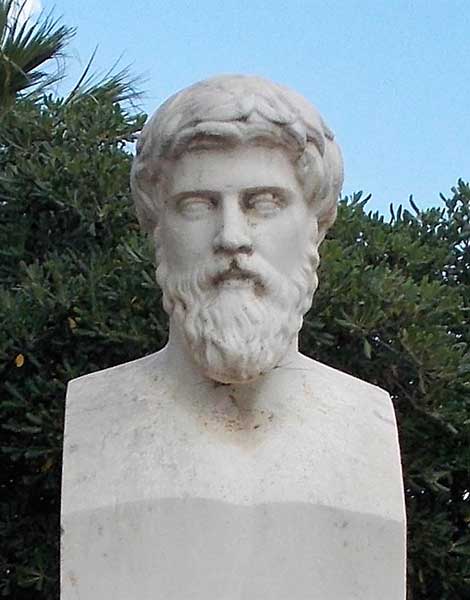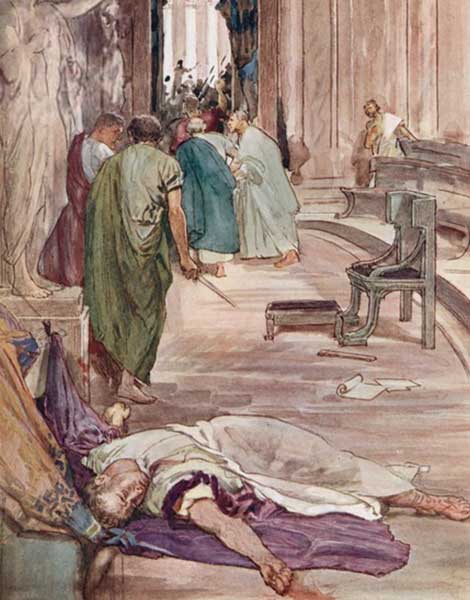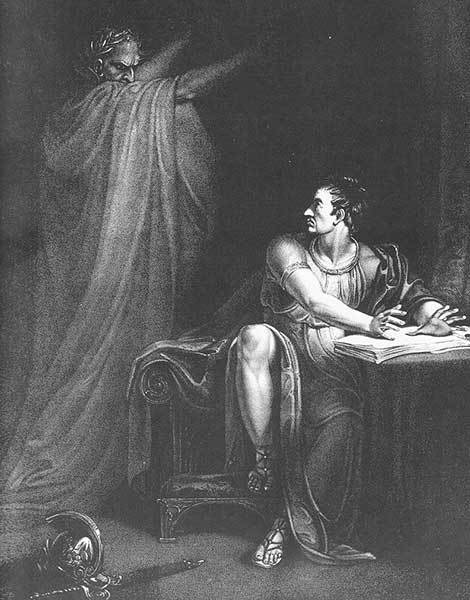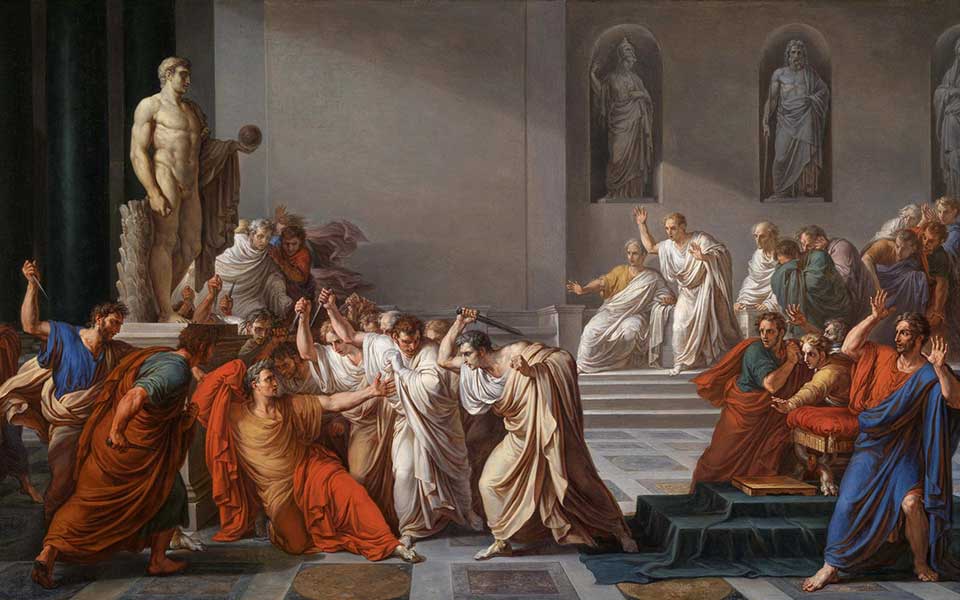Assassinated on the Ides of March in 44 BC, Caesar’s famous last words in Latin, according to Shakespeare, were “Et tu, Brute?” The ancient sources say otherwise.
Few people have had such a profound and lasting impact on the future course of history than Gaius Julius Caesar, dictator of Rome from 49 to 44 BC. One of the greatest military commanders to have ever lived, even the sound of his name, often shortened to the simple cognomen “Caesar,” evokes a deep sense of awe.
Born into one of the oldest and most aristocratic families in Rome, the events and immediate aftermath of Julius Caesar’s extraordinary life in the mid-1st century BC triggered the end of the Roman Republic, the system of constitutional government that had been in place for nearly 500 years, and gave rise to the Roman empire.
Caesar’s early career included a series of spectacular military victories, most famously over the feared Gauls (in modern-day France), expanding Rome’s territorial borders and winning him the admiration and respect of the Roman people. Over time, and with the support of his battle-hardened legionaries, he consolidated ever greater power for himself, seeing off political rivals, and initiating a series of unprecedented social and economic reforms.
Appointed dictator in 49 BC, Caesar assumed increasing authority and diminished the role of Rome’s age-old political institutions. As such, many in the ruling senatorial class viewed him as a threat to the established order, a tyrant that had to be removed at all cost.

Possible bust of Julius Caesar, posthumous portrait in marble, 44–30 BC, Museo Pio-Clementino, Vatican Museums.

Bust of Plutarch at Chaeronea. The ancient Greek historian wrote a detailed account of Caesar's assassination.
History’s Most Famous Assassination
While Julius Caesar’s extraordinary career as a military leader and statesman provides source material for countless books, works of art, stage plays, and films, arguably the most fascinating aspect of his tumultuous life is how it came to such a violent and ignoble end, murdered at a senate meeting on the Ides of March (March 15), 44 BC.
What do we know of Caesar’s last moments – history’s most famous assassination? And what, if anything, did he say as he fell bleeding to death from 23 stab wounds?
Assassinated by a group of senators calling themselves the “Liberators,” the precise details of Caesar’s untimely death continue to be a source of morbid speculation, clouded by conflicting accounts by the ancient writers. Nevertheless, some details emerge with chilling clarity.
We know that the assassination took place during a meeting of the Senate at the Curia of Pompey, a meeting hall inside the Theatre of Pompey in the heart of ancient Rome, and at least 60 senators were party to the conspiracy. We also know the main ringleaders were Brutus and Cassius, the former being the son of Caesar’s former lover, Servilia.
Writing at the beginning of 2nd century AD, some 150 years after the events, Greek historian Plutarch, born in Chaeronea, Boeotia, provides one of the most detailed descriptions of the assassination. According to his account, Caesar entered the meeting hall, took his seat at the podium, and was presented with a petition by senator Tillius Cimber, one of the main conspirators. Moments later, he was mobbed by the group, as Cimber grabbed Caesar’s shoulders and pulled the toga away from his neck – the signal to begin the attack.

The Assassination of Julius Caesar, painted by William Holmes Sullivan, c. 1888
“Kaì sý, téknon;”
Caesar’s surprised retort in Latin, “Ista quidem vis est!” (“Why, this is violence!”) was immediately met by a violent dagger thrust to the neck by senator Casca, the first assassin to deal a glancing blow, prompting Caesar to exclaim, again in Latin, “Casca, you villain, what are you doing?” A brief struggle between the two men ensued before the others joined in the frenzied attack.
Attempting to fight back but blinded by the blood in his eyes, Caesar “cried aloud” as he collapsed on the lower steps of the portico. Plutarch’s account ends with Caesar pulling his toga over his head when he saw Brutus among the assassins, but mentions that he died in silence.
The Roman historian Suetonius, also writing at the start of the 2nd century, noted that while Caesar was stabbed 23 times, the physician who performed the autopsy established that only one wound, the second stab to his chest, had been fatal.
Like Plutarch, Suetonius agrees that Caesar likely said nothing in his dying moments, overcome with shock and the loss of blood, but mentions that other contemporary accounts had him address Brutus with the Greek phrase, “Καὶ σύ, τέκνον;” (“Κaì sý, téknon?” – “You too, child?” or “You too, son?”).
The Roman historian Cassius Dio, writing at the end of the second century, also reports that other commentators had put forward the same phrase in their accounts of the assassination.

"The Assassination of Caesar" by William Rainey

Brutus and the Ghost of Caesar (1802), copperplate engraving by Edward Scriven from a painting by Richard Westall, illustrating Act IV, Scene III, from Shakespeare's Julius Caesar.
Closer to our own time, William Shakespeare’s famous play “The Tragedy of Julius Caesar,” first performed in 1599, has Caesar deliver the immortal line: “Et tu, Brute? Then fall Caesar!” Shakespeare, well educated in both Greek and Latin, likely employed the Latin phrase “Et tu, Brute?” to dramatic effect because more of his audience would have been familiar with the language, but it is not found in any of the ancient sources.
Among modern scholars, the most widely accepted theory is that Caesar either said nothing as he lay dying, or uttered the Greek phrase “Kaì sý, téknon.” Upper class Romans would have moved easily between Latin and Greek in everyday speech, but while the oft-used translation of the Greek is “You too, my son?” others have argued the phrase – commonly used in ancient Greek comedy – could have also meant, “Screw you, kid!” – reminding us that Caesar, a seasoned soldier, was defiant to the last.
Aftermath
Julius Caesar’s brutal assassination in 44 BC created a power vacuum that plunged Rome into chaos and civil war, involving some of the largest battles in history, inlcuding the naval Battle of Actium off the west coast of Greece in 31 BC.
Following a decade and a half of war, Caesar’s nephew Octavian emerged victorious, transforming the Republic into the Roman empire as “Caesar Augustus,” Rome’s first emperor.









